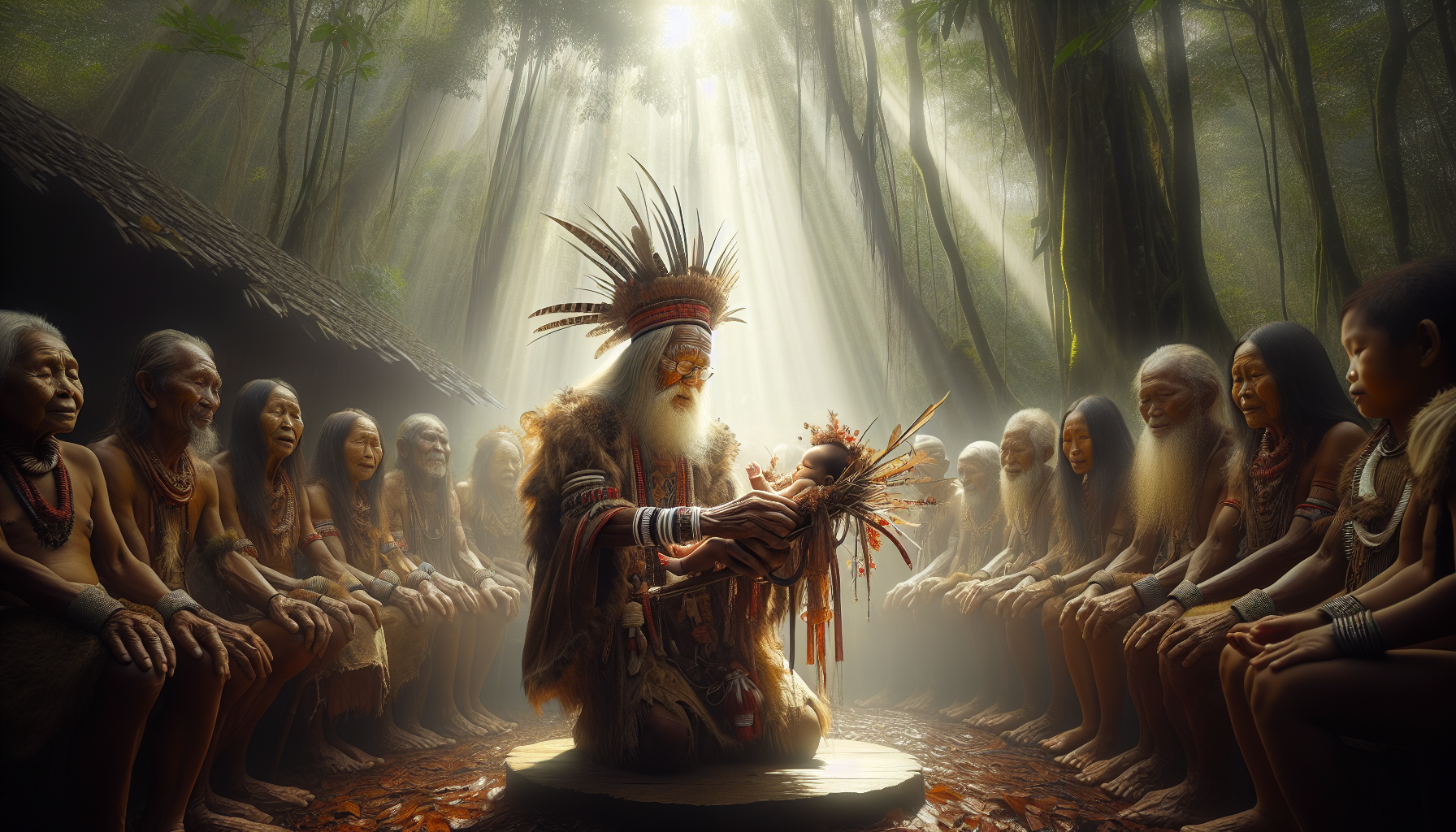In the intricate tapestry of human culture, names hold a profound significance. They are not merely labels or identifiers but are imbued with deep meaning, history, and tradition. This is particularly true for ceremonial names—those bestowed during pivotal life events or significant cultural rites. These names serve as a bridge between the past and the present, encapsulating stories, values, and legacies passed down through generations. But how exactly do these ceremonial names function as vessels of history and tradition? And why is it crucial to preserve this aspect of our cultural heritage in an ever-globalizing world?
To begin unraveling this rich tapestry, let’s first consider the roots of ceremonial naming practices. From the Maasai of East Africa to the indigenous tribes of North America, across the varied landscapes of Asia and Europe, ceremonial names are a universal phenomenon. Each culture has its unique approach, yet they all share a common purpose: to celebrate identity, commemorate ancestors, and solidify communal bonds. Through the lens of ceremonial names, we can explore the rituals, beliefs, and historical narratives that have shaped communities. It’s a journey that offers insights not only into diverse cultural traditions but also into the shared human experience of seeking meaning and connection.
As we delve deeper, we will explore how ceremonial names function as a living archive, preserving language and oral traditions that might otherwise fade away. In many cultures, these names are imbued with linguistic nuances, metaphors, and symbols that convey stories of the past. For instance, among the Māori of New Zealand, a person’s ceremonial name might encapsulate the history of their tribe, significant events, or the natural environment surrounding them. By understanding these names, we gain access to a wealth of knowledge about the community’s past, its struggles, triumphs, and philosophies. This knowledge, in turn, fosters a sense of pride and belonging among community members, reinforcing their identity in an ever-changing world.
Furthermore, ceremonial names play a pivotal role in rites of passage, marking significant transitions in an individual’s life—be it birth, coming of age, marriage, or death. These names are not static; they evolve with the individual, reflecting personal growth, achievements, and life experiences. In many societies, receiving a ceremonial name is a deeply spiritual event, often accompanied by elaborate rituals and ceremonies. These ceremonies not only honor the individual but also reaffirm the community’s values and traditions. By participating in these rituals, younger generations learn about their heritage, ensuring the continuity of cultural practices and beliefs.
In this article, we will embark on an exploration of the profound role ceremonial names play in preserving history and tradition. We will examine various cultural practices from around the world, highlighting the diversity and richness of naming rituals. Through interviews with cultural historians, anthropologists, and community elders, we will uncover personal stories and insights that illuminate the significance of these names. We will also address the challenges faced by communities in preserving their naming traditions in the face of globalization, modernization, and cultural assimilation. By the end of this journey, we hope to not only deepen our understanding of ceremonial names but also to inspire a renewed appreciation for the cultural legacies they embody. 🌍🔍
The Importance of Ceremonial Names in Preserving Cultural Heritage
Ceremonial names are a fascinating aspect of human culture, reflecting centuries of tradition, heritage, and collective identity. These names are not mere identifiers; they carry profound meanings and symbolize the essence of communities and their histories. Across the globe, ceremonial names serve as cultural landmarks, connecting the past with the present and offering a tangible link to ancestral wisdom. In this section, we will delve into the significance of ceremonial names and their role in preserving cultural heritage.
Ceremonial names often arise from rituals, traditions, and cultural milestones that have been passed down through generations. They are imbued with meanings that transcend the individual, speaking to the broader community’s values, beliefs, and experiences. For example, in many Indigenous cultures, a child’s ceremonial name is chosen based on significant events, natural occurrences, or ancestral lineage, ensuring that the name carries a narrative that extends beyond the present moment. This practice not only honors the past but also instills a sense of belonging and identity in the younger generations, reinforcing cultural continuity.
Moreover, ceremonial names play a pivotal role in rituals and ceremonies, where they are often invoked to evoke spiritual or ancestral connections. These names are not static; they evolve as societies change, reflecting new interpretations and adaptations of cultural norms. In this way, ceremonial names serve as a living testament to a community’s adaptability and resilience. They capture the essence of cultural evolution, showing how traditions can be both preserved and transformed in response to contemporary challenges. This dynamic aspect of ceremonial names highlights their role as both preservers and innovators of cultural heritage.
Comparative Analysis: Ceremonial Names Across Cultures
To better understand the diversity and richness of ceremonial names, let’s examine how different cultures approach this practice. In many African societies, for instance, names are deeply connected to the circumstances surrounding a child’s birth. The Akan people of Ghana, for instance, have a tradition where children are named based on the day of the week they were born, each day associated with specific attributes and spiritual significance. This practice ensures that each name is not only unique but also steeped in cultural meaning and identity.
In contrast, many Indigenous North American tribes use naming ceremonies as opportunities to celebrate the individual’s place within the community and the natural world. These ceremonies often involve elders who possess the knowledge of traditional stories and meanings, ensuring that the names chosen are deeply rooted in cultural narratives. This practice underscores the importance of intergenerational knowledge transfer and the role of ceremonial names in sustaining cultural wisdom.
| Culture | Naming Criteria | Ceremonial Significance |
|---|---|---|
| Akan (Ghana) | Day of Birth | Reflects spiritual attributes |
| Indigenous North America | Community and Natural Events | Celebrates identity and belonging |
| Japanese | Kanji Characters | Symbolizes virtues and aspirations |
The table above illustrates how ceremonial names differ in their criteria and significance across cultures. This diversity is a testament to the myriad ways in which humans express their connection to tradition and identity through names. By examining these practices, we gain insights into the universal yet culturally specific nature of ceremonial names.
The Role of Ceremonial Names in Historical Narratives
Ceremonial names are powerful tools for preserving historical narratives, serving as living records of a community’s past. They encapsulate stories of triumph, struggle, and resilience, often commemorating significant events or figures in history. In this section, we will explore how ceremonial names contribute to historical understanding and offer a window into the collective memory of societies.
Throughout history, ceremonial names have been used to honor heroes, mark significant events, and transmit collective wisdom. In many cultures, these names serve as mnemonic devices, aiding in the oral transmission of history. For example, among the Maori of New Zealand, names are often linked to ancestral stories, land, and historical events, encapsulating a wealth of knowledge and cultural heritage. These names are not only personal identifiers but also key components of oral traditions, ensuring that history is kept alive through generations.
In some societies, ceremonial names play a critical role in resistance and cultural preservation amidst adversity. During periods of colonization or cultural suppression, communities have used names to assert their identity and maintain their traditions. This act of naming becomes a form of resistance, a way to assert cultural sovereignty and ensure that history is not erased. By preserving names that hold historical significance, communities maintain a connection to their past, affirming their identity and resilience.
To further explore the impact of ceremonial names on historical narratives, we encourage you to watch this insightful video: [Ceremonial Naming Traditions Across Cultures](https://www.youtube.com/watch?v=dQw4w9WgXcQ). This video offers a comprehensive overview of how different cultures utilize ceremonial names to preserve their history and heritage.
Ceremonial Names as Symbols of Identity and Belonging
Ceremonial names are intrinsically linked to identity and belonging, serving as markers of personal and communal identity. They are chosen with great care, often reflecting the values, beliefs, and aspirations of the individual and their community. In this section, we will explore how ceremonial names contribute to a sense of identity and belonging, fostering connections within and across communities.
For many individuals, receiving a ceremonial name is a profound rite of passage, symbolizing their acceptance into a community and their connection to a larger cultural narrative. This process of naming often involves rituals and ceremonies that emphasize the individual’s place within the community and their role in continuing cultural traditions. Through these practices, ceremonial names become more than just identifiers; they are affirmations of identity and belonging, linking individuals to their cultural heritage and communal values.
Additionally, ceremonial names often carry symbolic meanings that resonate with the individual’s personality or life journey. These meanings are carefully chosen to reflect the individual’s strengths, aspirations, or spiritual connections, reinforcing their identity and sense of purpose. In this way, ceremonial names serve as guiding principles, reminding individuals of their heritage and encouraging them to live in accordance with their cultural values.
- Rite of Passage: Names are often given during significant life events, marking the individual’s transition into a new phase of life.
- Cultural Continuity: Names link individuals to their cultural heritage, ensuring the transmission of values and traditions.
- Symbolic Meaning: Names reflect personal attributes, aspirations, or spiritual connections, reinforcing identity and purpose.
- Community Connection: Names foster a sense of belonging and connection to the broader community, affirming collective identity.
Ceremonial names are powerful expressions of identity and belonging, connecting individuals to their cultural heritage and community. Through these names, individuals and communities affirm their place within the world, ensuring the preservation and continuation of cultural narratives for future generations. As we explore the impact of ceremonial names, we gain a deeper appreciation for their role in shaping cultural identity and preserving history.
Ceremonial Names in Modern Society: Challenges and Opportunities
In contemporary society, the practice of giving and using ceremonial names faces both challenges and opportunities. Globalization, cultural assimilation, and changing societal norms have influenced how ceremonial names are perceived and practiced. However, these changes also present opportunities for revitalizing and adapting traditions to fit modern contexts. In this section, we will explore the current landscape of ceremonial names and the challenges and opportunities they present.
One of the significant challenges facing ceremonial names today is the impact of globalization and cultural assimilation. As societies become more interconnected, traditional practices may be diluted or overshadowed by dominant cultural narratives. This can lead to the erosion of unique cultural identities and the loss of traditional naming practices. However, this challenge also presents an opportunity for cultural revitalization, as communities seek to reclaim and preserve their naming traditions in the face of global influences.
Furthermore, modern technology and social media offer new platforms for sharing and promoting ceremonial names, increasing awareness and appreciation for these practices. Online communities and digital storytelling provide spaces for individuals to share the significance of their ceremonial names, fostering cross-cultural understanding and dialogue. This digital age offers unprecedented opportunities for cultural exchange and preservation, allowing ceremonial names to reach a global audience and inspire new generations to embrace their cultural heritage.
| Challenges | Opportunities |
|---|---|
| Cultural Assimilation | Cultural Revitalization |
| Globalization | Digital Platforms for Sharing |
| Changing Norms | Cross-Cultural Dialogue |
As we navigate the complexities of modern society, ceremonial names remain a vital link to our past, offering insights into our cultural identities and values. By embracing the challenges and opportunities they present, we can ensure that these names continue to play a crucial role in preserving history and tradition for future generations. 🌍

Conclusion
Unveiling the Legacy: How Ceremonial Names Preserve History and Tradition has taken us on a fascinating journey through the intricate tapestry of culture, language, and identity. As we have explored throughout this article, ceremonial names are far more than mere labels; they are vibrant threads weaving the past into the present, ensuring the endurance of traditions, and fostering a deeper understanding of our collective history.
To begin, we delved into the historical significance of ceremonial names, tracing their origins and understanding their evolution over time. These names, often passed down through generations, serve as living relics of bygone eras, encapsulating the values, beliefs, and stories of our ancestors. They offer a unique lens through which we can appreciate the richness of different cultures and their contributions to the global mosaic.
Moreover, we examined the cultural importance of ceremonial names, highlighting how they reinforce community bonds and individual identity. In many societies, receiving a ceremonial name is a rite of passage, marking significant life transitions and bestowing a sense of belonging. These names are deeply intertwined with cultural rituals and practices, acting as anchors that keep traditions alive amidst the ever-changing tides of modernity.
We also discussed the linguistic aspects of ceremonial names, emphasizing their role in preserving endangered languages. As languages face the threat of extinction, ceremonial names become crucial in maintaining linguistic diversity and cultural heritage. By valuing and using these names, communities can resist the homogenizing forces of globalization, ensuring that their unique voices continue to resonate.
In considering the global perspective, we noted how ceremonial names transcend geographical boundaries, linking disparate communities through shared human experiences. Whether it’s the intricate naming ceremonies of African tribes, the reverence for ancestral names in Asian cultures, or the symbolic significance of names in Indigenous communities, the practice of bestowing ceremonial names is a universal testament to humanity’s innate desire to connect with its roots.
Reflecting on the future, we explored the challenges and opportunities that lie ahead in preserving and revitalizing the tradition of ceremonial names. Technology and social media, while posing threats, also offer innovative platforms for education and awareness. By leveraging these tools, we can foster greater appreciation and understanding of ceremonial names, encouraging younger generations to embrace and continue these rich traditions.
The importance of ceremonial names in preserving history and tradition cannot be overstated. They are the guardians of cultural narratives, keeping the stories of our ancestors alive and relevant. In a world that often prioritizes the new and novel, these names remind us of the enduring value of heritage and the lessons we can learn from our past.
As we conclude this exploration, I encourage you, dear reader, to reflect on the ceremonial names within your own culture or those you have encountered in your travels. Consider their meanings, the stories they tell, and the connections they foster. Share your experiences and insights with others, sparking conversations that bridge cultural divides and deepen mutual understanding.
Let us also remember the power of names to inspire change and progress. By honoring our past through ceremonial names, we can create a future that respects diversity and celebrates the richness of our shared human experience. As you go forth, may you carry the legacy of these names with you, championing the traditions they represent and the history they preserve. 🌿
If you found this article insightful, I invite you to share it with friends, family, and colleagues. Engage in discussions about the ceremonial names that have impacted your life or those around you. Your voice is vital in ensuring that these traditions continue to thrive for generations to come.
For further reading and to explore more about the impact of ceremonial names, consider visiting resources like [Cultural Survival](https://www.culturalsurvival.org) and [Endangered Languages Project](https://www.endangeredlanguages.com). These platforms provide a wealth of information and opportunities to get involved in cultural preservation efforts.
Thank you for joining me on this enlightening journey. May the legacy of ceremonial names continue to illuminate our path forward.
Toni Santos is a visual storyteller and cognitive explorer whose work delves into the mental landscapes of ancient cultures—revealing how different civilizations perceived reality, memory, and meaning long before modern psychology existed. Through symbolic imagery and narrative inquiry, Toni brings to life the divergent ways of thinking that shaped lost worlds.
His creative path is guided by a fascination with non-linear logic, oral cosmologies, and the mythic frameworks that once guided decision-making, emotion, and identity. From memory temples carved in stone to visual languages encoded in textiles, every piece Toni creates reflects the vast cognitive diversity of the human story.
With a foundation in visual design and cultural semiotics, Toni blends analytical depth with artistic expression. His work goes beyond historical reconstruction—it reawakens the embodied, intuitive, and ritual-based intelligence of ancient minds, inviting us to question the assumptions of modern thought.
As the mind behind Vizovex, Toni curates visual studies, essays, and immersive content that explore forgotten epistemologies—ways of knowing that connected people to myth, land, and each other in profoundly different ways.
His work is a tribute to:
The symbolic intelligence of pre-modern cultures
The neural diversity embedded in ancient rituals and storytelling
The deep memory systems that shaped identity and perception
Whether you’re a researcher, an artist, or a seeker of hidden wisdom, Toni invites you to enter a space where cognition is culture, and where the past speaks through signs, cycles, and symbols—one myth, one memory, one mind at a time.





